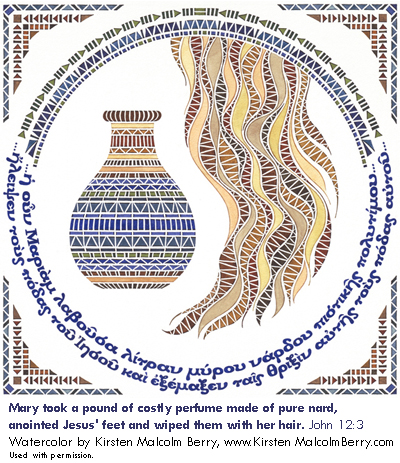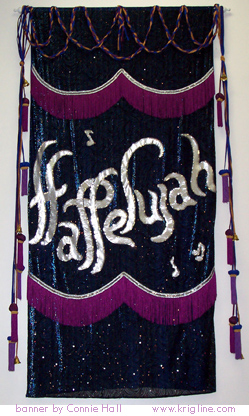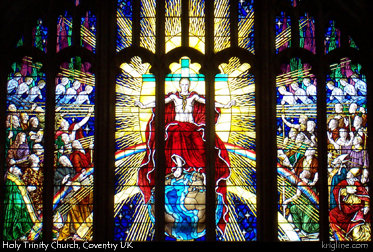(continued from left column)
Point 4. Worship should not be possible for us
because it is a…
Royal/professional activity, unsuited for
untrained, common men and women (laypeople)
Not only is Worship a Holy Activity and Heavenly Activity for
which humans are not naturally suited, it is also a professional
activity unsuited for untrained, common men & women/laypeople.
What did the OT “professionals” (Levites) have to go through
in order to worship God? Among other things, they had to change their
clothes, wash in prescribed ways, sprinkle things/themselves with blood,
use a specially-formulated incense in specially-made sensors, undergo
training, and be in Judah’s “blood line.” They couldn’t be sick in any
way, bleeding, impaired, handicapped…. In a nutshell, it was not easy to
become an Old Testament worshipper, but this was a high and holy calling,
so why should it be easy?!
Even today, many think that worship is only for the
theologically trained, and to some extent they are correct. The BLOOD
gives us access, but we must not trample that grace underfoot in an
unworthy manner. Thus the role of a worshiper (especially one who leads
worship) must not be taken for granted. I tremble when I must stand
before people as God’s spokesman, and a little of this awe and fear is a
healthy thing for anyone who gets to stand on this podium!
You don’t just waltz into a king’s presence or into an
audience with a President—unless, perhaps, he is your daddy—and there lies
the positive side to this aspect of the impossibility of worship! The Holy
Spirit invites US to worship the Father, and even to call him
“Abba/Daddy”—and when we thus approach with the boldness and innocence of
a son or daughter, even the angels marvel. BUT even a child knows it is
best to wash his hands before going to see his Daddy the King.
Listen to Paul’s instructions to Timothy:
8I
desire then that in every place the men should pray, lifting holy hands
without anger or quarreling; likewise also that women should adorn
themselves in respectable apparel, with modesty and self-control, not with
braided hair and gold or pearls or costly attire, but with what is proper
for women who profess godliness—with good works.” (1 Tim 2:8-10 ESV)
Since worship is a “royal” activity, only suited for
professionals (and relatives), it is important that we enter the Divine
Presence in the way God expects—with clean hands and a clean heart, with
modesty and self-control, realizing that this is our Daddy who bids us to
come, but also realizing that He is our GOD.
Point 5. Worship is easy to describe as weird
because…
Biblical worship is full of extremes that people
find it impossible to balance
Biblical worship is also easy to describe as “weird” because
it envelops so many EXTREMES. What looks perfectly Biblical and uplifting
to me, may look pagan (or worse) to you. And people are not very good at
balancing such diverse forms of expression. Just think of how different
Christian worship looks in Rome, Moscow, Greece, Ethiopia, Cote d’Ivoire,
Los Angeles, Duluth and Atlanta. Should worship be loud/soft; slow/fast;
using noisy instruments or only the human voice; involving repentant
prostration or exuberant dancing? They are all in the Bible.
According to the Spirit Filled Life Bible, even the
Hebrew word “Shabach” (praise) goes in two directions. The verb occurs 11
times, 8 to mean to commend, praise; to adore; to glory in something; and
3 to mean to still, quiet, or pacify someone.
It is hard to synthesize all of this variety, and accept
practices that differ from our own. Dr. Robertson McQuilken, the
university president when I was in graduate school, liked to say: “We
humans find it easier to take one side of Biblical truth to one extreme or
the other, neglecting the balancing truths of Scripture rather than
finding the center of biblical tension.”
Worship is weird because it envelops diverse extremes. Mix in
traditions and temperaments, and the result is a lot of “tension” in the
Church, especially in an international fellowship like this one. We are
blessed to have a diverse group of worship teams; if you are visiting and
didn’t particularly like the worship style today, come back next week and
it will be a bit different. Leading worship in a fellowship like this is
particularly difficult, so when you are tempted to complain about
something, why not pray for the teams instead? No matter what our worship
looks or sounds like, someone is going to see it as being weird.
The “other side” of this tension between extremes is the way
that it expands our understanding of the One we worship, giving us a
broader circle of friends in the Body of Christ. Again, it’s a taste of
heaven. When we get there, maybe we’ll be holding hands with someone who
thought that only those who sang from their hymnal or who had
tasted their Communion wafer would be there. As they look at us in
surprise, we can say, “I’m so glad that God’s grace is bigger than any of
us could imagine.”
So, again, to review--worship is weird because it is a…
heavenly, invisible, holy and royal activity,
for which we are ill-suited; an activity full of extremes that are
hard to balance.
Point 6. Worship is easy to describe as weird
because it is a…
Private/personal activity done in public (others
are bound to see it as strange)
And finally, others are bound to see your expression of
worship as strange because worship is fundamentally a private/personal
activity, but we often do it in front of other people—that is, in public.
The best way to illustrate this point is to look at how some
of the people in the Bible worshiped God. Now maybe you are used to these
stories and understand the worshipper’s intentions, but think about them
from the point of view of those around at the time. Friends, these actions
are weird.
Let’s start with the OT sacrifices. Let’s say you are a new
convert to Judaism in the first century, and you want to know how to
worship God. We can get an answer from a number of scriptures, but let’s
look at Exod 29:38.
“Now this is what you shall offer on
the altar: two lambs a year old day by day regularly. One lamb you shall
offer in the morning, and the other lamb you shall offer at twilight. And
with the first lamb a tenth measure of fine flour mingled with a fourth of
a hin of beaten oil, and a fourth of a hin of wine for a drink offering.
The other lamb you shall offer at twilight, and shall offer with it a
grain offering and its drink offering, as in the morning, for a pleasing
aroma, a food offering to the Lord. It shall be a regular burnt offering
throughout your generations at the entrance of the tent of meeting before
the Lord, where I will meet with you, to speak to you there.” (Exod
29:38ff ESV)
To a Greek intellectual or a northern European slave, this
would surely sound weird! “Didn’t your mother ever tell you not to play
with or waste food?”
Now, I admit that sometimes I envy the OT priests. At least
they KNEW how to worship God, because God had very specifically told them!
But how much more precious is New Testament worship—full of the variety
and personal expression that we enjoy!
Yet, whatever it’s limitations, OT worship demonstrated the
COST involved in worship, and it met the need/desire to show God one’s
love. When you brought the choicest part of your flock or wine or harvest,
it was like saying:
“Here, God. Here is meat for you to eat, wine
for you to drink.
I could have kept these for myself, but I give them to you.
See how I love you.”
Next, let’s look at David. Turn to 2 Samuel 23:14. David is
well known for his musical worship, but this is an interesting story of a
different form of worship.
To put this in context, turn to your neighbor, and tell
him/her what food, spice or treat you miss most from back home….
David was then in the
stronghold, and the garrison of the Philistines was then at Bethlehem. And
David said longingly, “Oh, that someone would give me water to drink from
the well of Bethlehem that is by the gate!”
[When I read that last direction—“by the gate”—I can’t help
but think of someone saying; “If you are ever passing through the Hong
Kong airport, bring me a Popeye’s Biscuit—its in the main concourse, go up
the stairs, it’s by the gate…]
16Then the three mighty men broke
through the camp of the Philistines and drew water out of the well of
Bethlehem that was by the gate and carried and brought it to David. But he
would not drink of it. He poured it out to the Lord and said, “Far be it
from me, O Lord, that I should do this. Shall I drink the blood of the men
who went at the risk of their lives?” Therefore he would not drink it.
(2 Sam 23:14ff ESV)
Think of how you would have felt if you were one of those
soldiers. You’ve just risked your life to get the general a cup of water
from his hometown, and when you give it to him, he pours it on the ground.
Friends, that is weird! “Hey, David, drink it—you said you wanted it!
Don’t waste it! Don’t just throw it out!”
But David wasn’t throwing it out. He was giving it to God.
“Here, Lord. Here’s water, from the place closest to my heart. It
represents the faith and love of my men, and thus my own love as well. I
pour it out to you. Here’s water from my heart—I pour it out unto You.”
David poured himself out in a different way in 2 Samuel 6. A
special chest called The Ark of the Covenant had been in enemy
hands, and then it had been in some guy’s barn, and now David wanted it
back in the Tabernacle. So he had quite a parade for the holy box! They
sacrificed animals every few meters, and David danced around like a wild
man. This is how it reads in the Contemporary English Version (CEV).
David was dancing for the
Lord with all his might, but
he wore only a linen cloth. 15 He and everyone else were
celebrating by shouting and blowing horns while the chest was being
carried along.
16
Saul’s daughter Michal [David’s wife]
looked out her window and watched the chest being brought into David’s
City. But when she saw David jumping and dancing for the
Lord, she was disgusted.
17
They put the chest inside a tent that David had
set up for it. David worshiped the
Lord by sacrificing animals and burning them on an altar, 18
then he blessed the people in the name of the
Lord All-Powerful. 19
He gave all the men and women in the crowd a small loaf of bread,
some meat, and a handful of raisins, and everyone went home.
[NOTICE that David’s worship also has a practical side that blesses
others.]
20 David went home so he could
ask the Lord to bless his
family. But Saul’s daughter [David’s wife] Michal went out and
started yelling at him. “You were really great today!” she said. “You
acted like a dirty old man, dancing around half-naked in front of your
servants’ slave-girls.”
21
David told her, “The
Lord didn’t choose your
father or anyone else in your family to be the leader of his people. The
Lord chose me, and I was
celebrating in honor of Him. 22 I’ll show you just how great I
can be! I’ll even be disgusting to myself. But those slave-girls you
talked about will still honor me!” (2 Sam 6: 4-22 CEV)
To David, this jumping and dancing was a way to take worship
to a higher level, but to his wife it looked weird—even disgusting. So
don’t be surprised if people misunderstand your intentions when you
worship.
Should David have toned down to suit his wife’s opinions? He
didn’t, and gave no indication that he planned to do so. Sometimes we DO
have to compromise for the sake of our brothers and sisters, but the point
is: worship is an intensely personal expression, directed toward God. So
long as the Father, your PRIMARY audience, is pleased with what you are
doing, you don’t need to be overly concerned about how weird you look or
sound to the physical “audience” that happens to be in the same room.
Finally, let’s see the weird ways some New Testament ladies
chose to worship their Lord.
Look at Luke 7:36.
Imagine that you are having dinner with a city council member,
and a local pastor has also been invited. In fact, this pastor has become
rather popular and you are interested in meeting him. As you are talking
and eating a fine meal, a woman with a bad reputation—perhaps dressed in a
provocative way, or all coated with makeup—a “known sinner” comes in and
starts polishing the pastor’s shoes and crying like a baby. Then she sees
that she has missed a spot and wipes it with her hair. Friends—this is
weird! But this is how a woman chose to worship the Lord Jesus.
One of the Pharisees asked him to eat
with him, and he went into the Pharisee's house and reclined at the table.
And behold, a woman of the city, who was a sinner, when she learned that
he was reclining at table in the Pharisee's house, brought an alabaster
flask of ointment, and standing behind him at his feet, weeping, she began
to wet his feet with her tears and wiped them with the hair of her head
and kissed his feet and anointed them with the ointment (or
“fragrant oil” in some versions). (Luke 7:36-38 ESV)
This woman wasn’t likely a religious person who understood the
OT sacrificial regulations. She wasn’t a professional worshipper. But she
had somehow come to love Jesus and to find faith in Him, and this led to
an intensely personal and unquestionably weird form of expression. And
ever since it has served as a symbol of worship. Oil upon His feet. Tears
to wash off the dust, and her own hair to wipe them dry.

In John Chapter 12 we see another woman (some say it was the
same woman?) doing something similar. It is Mary, whose sister and brother
were Martha and Lazarus. Jesus has raised Lazarus from the dead, and in
John 12 we find Mary at the feet of Jesus in worship.
Six days before the Passover, Jesus
therefore came to Bethany, where Lazarus was, whom Jesus had raised from
the dead. So they gave a dinner for him there. Martha served, and Lazarus
was one of those reclining with him at table. Mary therefore took a pound
of expensive ointment made from pure nard, and anointed the feet of Jesus
and wiped his feet with her hair. The house was filled with the fragrance
of the perfume. But Judas Iscariot, one of his disciples (he who was about
to betray him), said, [“Why this waste?”
Mt 26:8] “Why was this ointment not sold for three
hundred denarii and given to the poor?” He said this, not because he cared
about the poor, but because he was a thief, and having charge of the
moneybag he used to help himself to what was put into it. Jesus said,
“Leave her alone, so that she may keep it for the day of my burial. For
the poor you always have with you, but you do not always have me.”
(John 12:1-8 ESV)
Like David, Mary did an intensely personal thing. Again it was
misunderstood by those who watched. It was a great sacrifice—it cost her a
lot. Interestingly, Jesus was clearly pleased, and publically praised
Mary’s private act. But she was determined to fill Jesus’ life with her
praise, even as the costly oil filled the air with its rich perfume.
So yes, worship is weird—or at least it is sometimes bound to
be seen as weird by others. Yes, worship is unnatural for natural
humans, because it is a…
Heavenly activity done on earth
Mostly invisible activity done in the visible realm
Holy activity performed by fallen mortals
& a royal/professional activity done by common
laypeople
Biblical worship is full of extremes people find it impossible to
balance, and it is a personal activity done in public. If you ever
feel weird or awkward when you worship around others, or even help lead
worship, you are not alone—and now you know why!
But it is equally true that worship gives the worshipper a
taste of heaven. To be a worshipper you must acknowledge that the unseen
realm is even more significant than the realm we can see and touch, and
amazingly, God actually SEEKS people who will worship Him in spirit and
truth. Thirdly, while fallen people can’t come near God, our savior Jesus
Christ makes it possible for US to perform this holy act—in fact, we can
approach ONLY by the blood of Jesus. To be an effective worshipper you
should be committed to learning more and more about the way God wants you
to worship—you should seek to become a “trained professional” worshipper,
with clean hands—even while you understand that your Daddy is the one who
calls you into worship and into relationship with Him. Because of the
variety in the Body of Christ, when we are around our brothers and sisters
we should strive for that dynamic place in the center of Biblical tension,
not at either extreme; we should humbly allow our brethren to worship
differently than we do, while also realizing that “what people think”
about your worship is never as important as the opinion and directions of
your real Audience, the One who remembers, and derives pleasure from our
worship.
Worship is a personal activity, expressed in the Bible with
images like wild dancing and penitent sobbing, loud music and silent
tears. This variety again gives us a taste of heaven, and challenges us to
comprehend with all the saints what is the breadth
and length and height and depth, and to know the love of Christ that
surpasses knowledge, that we may be filled with all the fullness of God.
(Eph 3:18-19 ESV)
Biblical worship is expressed as the pouring out of oil upon
Jesus feet, water poured out that was dear to David’s heart, and perfume
that pours out to fill the house with its costly sacrificial fragrance.
How does one express, in words or actions, the fullness of
this relationship we have with a God who is so far beyond words? Can any
words—any form of worship—be enough? Of course not. But aren’t you glad
that God has given the precious gift of worship—so that we can at least
try to express the depth of our love?
 Whether we are talking about ancient rituals—involving priests in fancy
robes, swinging censors and slaughtering lambs—or modern church services
with people mumbling prayers, raising their hands, cheering for God, or
sobbing in almost uncontrollable contrition…let’s face it, worship
can look really weird.
Whether we are talking about ancient rituals—involving priests in fancy
robes, swinging censors and slaughtering lambs—or modern church services
with people mumbling prayers, raising their hands, cheering for God, or
sobbing in almost uncontrollable contrition…let’s face it, worship
can look really weird.

